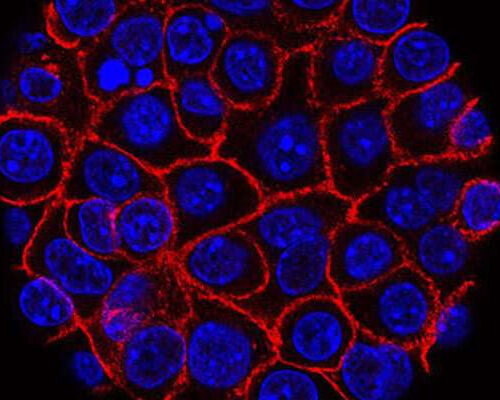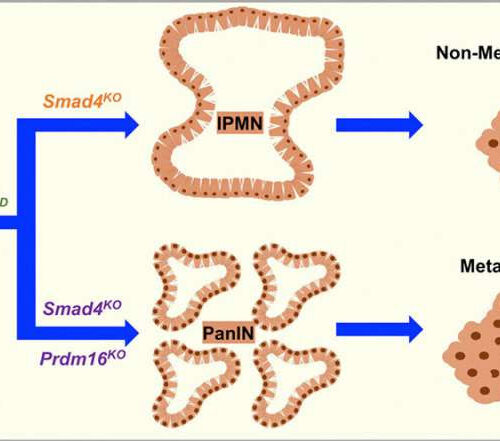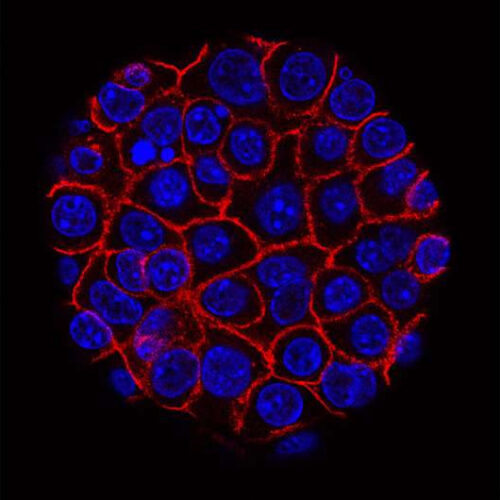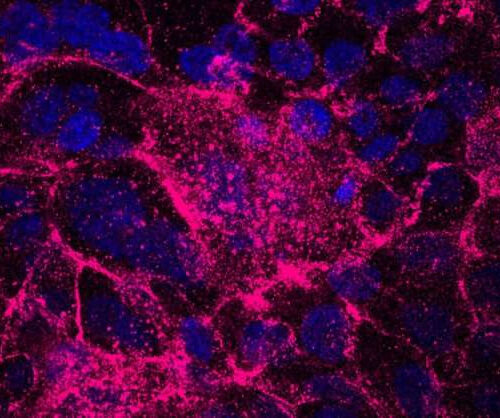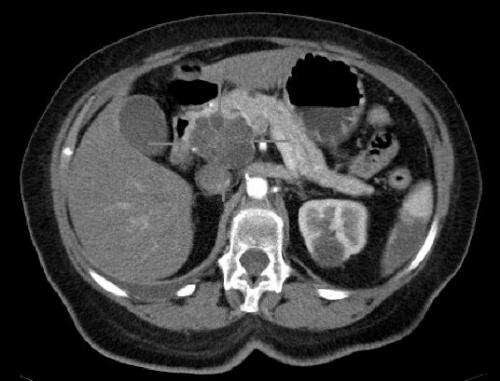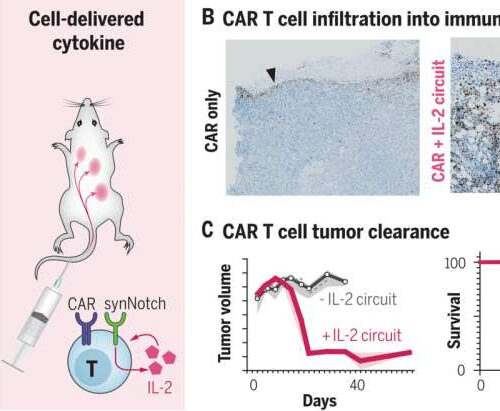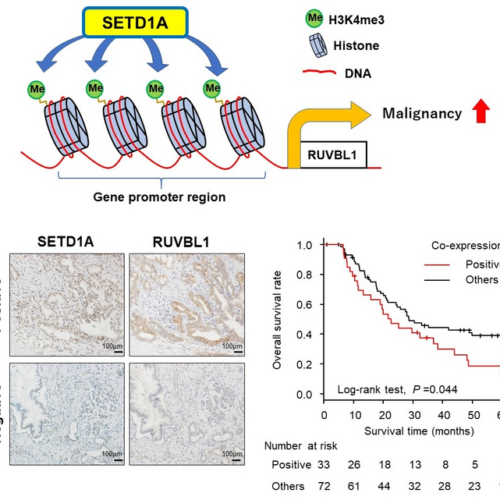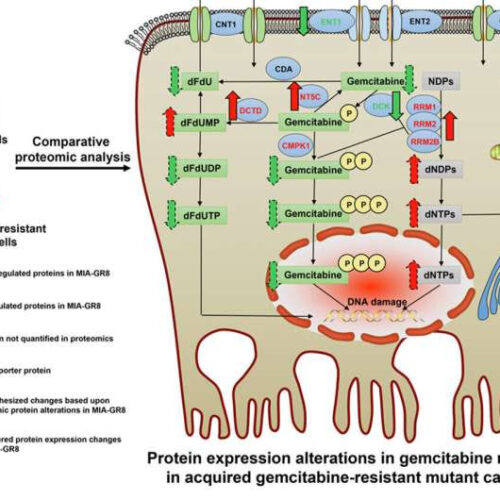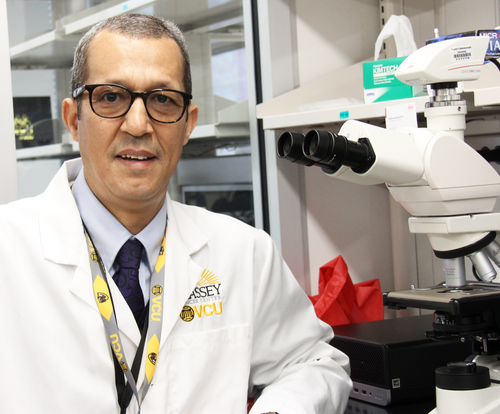by Karolinska Institutet Pancreatic cancer cells (blue) growing as a sphere encased in membranes (red). Credit: National Cancer Institute Immunotherapy is an effective form of therapy for different types of cancer. However, for pancreatic cancer, its effect is limited and differs between men and women. Researchers at Karolinska Institutet have now found a possible explanation for this...
Tag: <span>Pancreatic cancer</span>
Protein partnership effectively fends off pancreatic cancer progression
by Virginia Commonwealth University Model for the functional interaction between Smad4 and Prdm16 during PDAC formation and progression. Credit: Journal of Cell Biology (2023). DOI: 10.1083/jcb.202203036 Scientists at VCU Massey Cancer Center have uncovered a previously unrecognized relationship between two sets of proteins that operate in tandem to fend off the growth of pancreatic cancer. The findings...
How pancreatic cancer defies treatment by leveraging a protein
by University of California – San Diego Pancreatic cancer cells (nuclei in blue) are shown growing as a sphere encased in membranes (red). Credit: National Cancer Institute Pancreatic cancer is the third deadliest cancer in the United States, after lung and colorectal, though far less common. It is also among the hardest to effectively treat,...
Stress-tolerant cells shown to drive tumor initiation in pancreatic cancer
by University of California – San Diego Tumor-initiating cells (blue) produce an extracellular matrix containing fibronectin (pink) which gives them increased stress tolerance, drug resistance and tumor-initiating properties. Credit: UC San Diego Health Sciences Researchers at University of California San Diego School of Medicine have discovered a molecular pathway critical to the initiation of pancreatic tumors....
Study discovers triple immunotherapy combination as possible treatment for pancreatic cancer
by University of Texas M. D. Anderson Cancer Center Axial CT image with i.v. contrast. Macrocystic adenocarcinoma of the pancreatic head. Credit: public domain Researchers at The University of Texas MD Anderson Cancer Center have discovered a novel immunotherapy combination, targeting checkpoints in both T cells and myeloid suppressor cells, that successfully reprogrammed the tumor immune...
Killing pancreatic cancer with T cells that supercharge themselves
by University of California, San Francisco Therapeutic T cells engineered with tumor-triggered IL-2 production infiltrate and clear immune-excluded tumors. (A) We hypothesized that cell autonomous cytokine delivery will allow for, safer, more effective delivery of key inflammatory cytokines like IL-2. Specifically, IL-2 induction circuits that utilize synNotch to bypass requirements for CAR/TCR activation and provide...
New targets in the fight against pancreatic cancer
TOKYO MEDICAL AND DENTAL UNIVERSITY IMAGE: TOP, SETD1A, DIRECTLY RECRUITED TO THE RUVBL1 PROMOTER, ENHANCES RUVBL1 GENE EXPRESSION BY INCREASING H3K4ME3 LEVELS IN PANCREATIC CANCER CELLS. BOTTOM, HIGH CO-EXPRESSION OF SETD1A AND RUVBL1 CAN PREDICT WORSE PROGNOSIS THAN OTHERS. CREDIT: DEPARTMENT OF MOLECULAR ONCOLOGY, TMDU Researchers from Tokyo Medical and Dental University (TMDU) uncover an...
Researchers identify key metabolic regulators of drug resistance in the fight against pancreatic cancer
by Rebecca Brierley, University at Buffalo Graphical abstract. Credit: Molecular & Cellular Proteomics (2022). DOI: 10.1016/j.mcpro.2022.100409 Researchers from the University at Buffalo School of Pharmacy and Pharmaceutical Sciences recently published in Molecular & Cellular Proteomics, describing their work in identifying key metabolic regulators involved in cancer cell resistance to gemcitabine (Gem), a standard-of-care chemotherapy for pancreatic dual adenocarcinoma...
Study shows promise of new anti-KRAS drug for pancreatic cancer
UNIVERSITY OF PENNSYLVANIA SCHOOL OF MEDICINE PHILADELPHIA – A small molecule inhibitor that attacks the difficult to target, cancer-causing gene mutation KRAS, found in nearly 30 percent of all human tumors, successfully shrunk tumors or stopped cancer growth in preclinical models of pancreatic cancer, researchers from Penn Medicine’s Abramson Cancer Center showed, suggesting the drug is a strong candidate...
New genetic culprit suspected in the onset of pancreatic cancer
VIRGINIA COMMONWEALTH UNIVERSITY IMAGE: AZEDDINE ATFI, PH.D. CREDIT: VCU MASSEY CANCER CENTER New research out of VCU Massey Cancer Center points to the inactivation of a previously unidentified gene as a likely culprit in the development of pancreatic cancer. Recently published in Cell Reports, the findings could alter the scientific understanding of this deadly disease and inform the...

